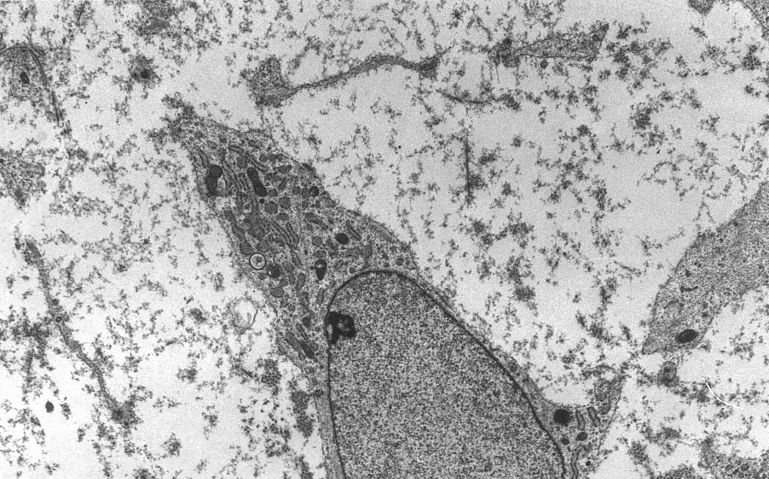Transmission electron micrograph of a mesenchymal stem cell displaying typical ultrastructural characteristics. Credit: Robert M. Hunt/Wikimedia Commons
A trio of concerned scientists is issuing a warning regarding use of the phrase "mesenchymal stem cells" or more popularly, MSCs. They claim the phrase is no longer useful because it encompasses too many cell types and because it has come to be associated with unproven medical applications. Douglas Sipp with the RIKEN research institute, Pamela Robey with the National Institutes of Health, and Leigh Turner with the University of Minnesota have together published a Comment piece in the journal Nature, calling for the phrase to be revised or eliminated from use.
Sipp, Robey and Turner note that the phrase was originally coined by biologist Arnold Caplan to describe cells he had found in bone marrow—cells that were able to differentiate into bone or cartilage. Since that time, many other researchers have used the term to describe cells in other body parts that were found to differentiate into certain types of tissue. But as the term became more well known, some scientists began to use it to describe different types of cells, some of which may not have been stem cells. And others began using it to refer to certain types of pluripotent cells, which are supposed to be capable of differentiating into virtually any type of tissue.
The authors suggest that the phrase also became popular with the press and by extension people outside of the field, which led to MSCs taking on an almost magical quality. And that, of course, led some to claim that they had unproven health benefits. According to the authors, the end result is a mess that needs to be cleaned up. They believe that the path to such a cleanup should involve several factors. The first is that the term be disowned by the scientific community. Researchers need to stop using it altogether. They also believe journals that publish papers should disallow use of the term in papers they accept for publication. But perhaps most importantly, they suggest that the global community needs to be more careful about how new science is conducted—labeling needs to be more precise so that phrases such as "mesenchymal stem cells" do not get coined in the first place.
More information: Douglas Sipp et al. Clear up this stem-cell mess, Nature (2018). DOI: 10.1038/d41586-018-06756-9
Journal information: Nature
© 2018 Phys.org
























